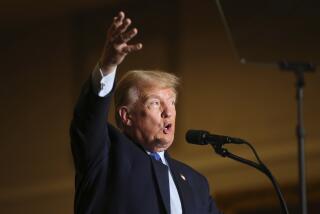Bush Waging a Bitter War of Words
- Share via
WASHINGTON — President Bush vows to smoke him out of caves and holes. Defense Secretary Donald H. Rumsfeld speaks of “draining the swamp.” Vice President Dick Cheney wants his “head on a platter.”
The Bush administration is doing its best to demonize and degrade suspected terrorist Osama bin Laden to rally support for retaliation and whet Americans’ appetite for bringing the exiled Saudi Arabian millionaire to justice “dead or alive.”
U.S. officials call Bin Laden the prime suspect in the Sept. 11 suicide hijacking attacks believed to have killed more than 6,000 people.
Public evidence linking Bin Laden and his Al Qaeda organization to the 19 hijackers is mostly circumstantial. That, however, has not stopped Bush and top members of his administration from using dehumanizing terms to describe him, often implying that Bin Laden and his fighters are loathsome animals.
“They run to the hills; they find holes to get in. And we will do whatever it takes to smoke them out and get them running,” Bush said.
This is not the first time an American president has demonized an enemy. Former Presidents Clinton and Bush did so against Iraqi President Saddam Hussein. The elder Bush even compared him to Hitler and sometimes gave the name “Saddam” a snarling, nasal pronunciation.
Clinton and his top aides depicted former Yugoslav President Slobodan Milosevic, now in custody in The Hague and awaiting trial on war crimes, as a bloodthirsty tyrant in advance of NATO’s 11-week bombing campaign in 1999.
Former President Bush used harsh language against former Panamanian leader Manuel Noriega, ousted from power in a 1989 U.S. invasion and now serving a 30-year sentence in Miami on drug-trafficking charges.
Dehumanizing an enemy is not only a common practice for leaders seeking to steel their countries for military action, “it is required,” said Anthony H. Cordesman, a defense analyst at the Washington-based Center for Strategic and International Studies.
“If the United States doesn’t raise it to this profile, many countries are not going to take us seriously. We have to signal that this is totally serious,” Cordesman said.
But personalizing an enemy also carries risks, suggested Fred Greenstein, a Princeton political science professor: “You rev up expectations. But that can set the stakes inappropriately high--because then you’ve got to go for this guy.”
He noted the obvious: Despite the rhetoric leveled at Hussein, he remains in power today, 10 years after the Persian Gulf War.
After using the “dead or alive” phrase, Bush toned down some of his subsequent references to Bin Laden so as not to inflame potential allies as he searched for diplomatic partners.
But administration officials made it clear Bin Laden remains public enemy No. 1.
In his speech to Congress and the nation, Bush warned Afghanistan’s leaders Thursday night they would share Bin Laden’s fate if he and his followers are not handed over immediately. “Our war on terror begins with Al Qaeda. . . . It will not end until every terrorist group of global reach has been found, stopped and defeated,” he said.
To Richard Murphy, a former U.S. assistant secretary of state who now is with the private Council on Foreign Relations, “the rhetoric is very much designed for the American ear.”
But Murphy said that it also sent mixed signals to the Arab world. “An Arab broadcasting station asked me, ‘Does “smoke him out of the hole” mean you’re going to start chemical warfare?’ ”
To many Americans, Bin Laden, 47, is a mysterious figure: thin, bearded and over 6 feet tall. The U.S. links him to the 1993 World Trade Center bombing, the 1998 terrorist attacks on two U.S. embassies in east Africa, and last October’s attack on the USS Cole in Yemen.
Few are ready to criticize Bush or his advisors for using strong language, given the enormity of the slaughter of innocents that French President Jacques Chirac has called “beyond crime . . . there are no words to qualify it.”
Two of the hijacked planes were flown into the World Trade Center twin towers, the third into the Pentagon, and the fourth crashed in a field in rural Pennsylvania near Pittsburgh.
“We have been at war with Osama bin Laden for over eight years, but until now we have failed to prosecute this war,” said Daniel Goure, a former Pentagon official now with the private Lexington Institute.
“The issue here has got to be, if you’re going to go after people, then you have to continue to go after these people.”
More to Read
Get the L.A. Times Politics newsletter
Deeply reported insights into legislation, politics and policy from Sacramento, Washington and beyond. In your inbox twice per week.
You may occasionally receive promotional content from the Los Angeles Times.










